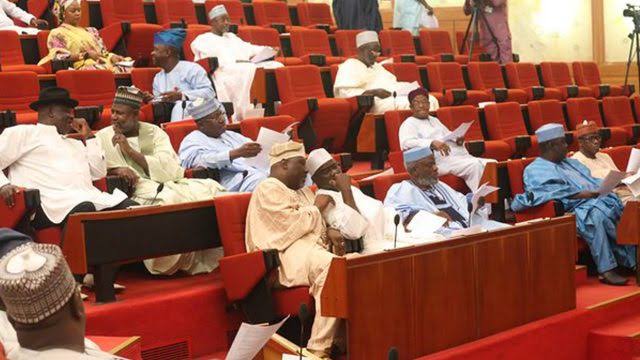Nigeria Senate has passed a motion seeking to appeal the judgment of the Federal High Court, Umuahia, on Section 84(12) of the Electoral Act 2022.
The Senate, in the motion, seeks to follow appropriate channel and appeal the judgment for the Appeal Court to set aside the Umuahia judgment.
The motion, titled “Urgent need to appeal the Judgment of the Federal High Court, Umuahia, on Suit No: FHC/UM/CS/26/2022, on Section 84(12) of the Electoral Act 2022″, was sponsored by Sen. George Sekibo (PDP-Rivers) and co-sponsored by 81 Senators.
Sekibo in his lead debate observed that a court in Umuahia, Abia, had in a suit marked FHC/MU/SC/26/2022, faulted the provision of Section 84(12) of the Electoral Act 2022, and declared it unconstitutional, invalid, illegal, null, void and of no effect.
The News Agency of Nigeria (NAN) reports that Section 84(12) of the Electoral Act 2022 states as follows:
“No political appointee at any level shall be a voting delegate or be voted for at the convention or congress of any political party for the purpose of the nomination of candidates for any election.”
Sekibo said that the Judge in his ruling said that Section 84(12) of the Electoral Act 2022 was inconsistent with Sections 66(1)(f), 107(1)(f), 137(1)(g) and 182(1)(g) of the 1999 Constitution of the Federal Republic of Nigeria as amended.
“Notes that for ease of reference, the Sections relied upon in the judgment as stated above are as follows:
“Section 66(1): No person shall be qualified for election to the Senate or the House of Representatives.
“(f) If he is a person employed in the public service of the Federation or of any State and has not resigned, withdrawn or retired from such employment 30 days before the date of election.
“Section 107 (1)(f) (1): No person shall be qualified for election to a House of Assembly if – (f) he is a person employed in the public service of the Federation or of any State and he has not resigned, withdrawn or retired from such employment thirty days before the date of election.
“Section 137(1)(g) (1): A person shall not be qualified for election to the office of President if: (g) being a person employed in the civil or public service of the Federation or of any state, has not resigned, withdrawn or retired from the employment at least thirty days before the date of the election.
“Section 182(1)(g) 182 (1): No person shall be qualified for election to the office of Governor of a State if (g) being a person employed in the public service of the Federation or of any State, he has not resigned, withdrawn or retired from the employment at least thirty days to the date of the election.
“Note further that Section 4 (1,2 and 3) of the 1999 Constitution of the Federal Republic of Nigeria as amended vested the power of law making for the Federal Republic of Nigeria on the National Assembly.
“The legislative powers of the Federal Republic of Nigeria shall be vested in a National Assembly for the Federation, which shall consist of a Senate and a House of Representatives.
“Aware also that in furtherance to the powers vested in the National Assembly, the 1999 Constitution under the roles of the Executive in that deals with political parties in Section 228 (a, b and d) confers more powers on the National Assembly, more particularly on political parties and effective management of the electoral process by the Independent National Electoral Commission.(INEC).
“That the National Assembly may by law provide – (a) guidelines and rules to ensure internal democracy within political parties, including making laws for the conduct of party primaries; party congresses and party conventions.
“(b) The conferment on the Independent National Electoral Commission of powers as may appear to the National Assembly to be necessary or desirable for the purpose of enabling the Commission more effectively ensure that political parties observe the practices of internal democracy, including the fair and transparent conduct of party primaries, party congresses and party conventions,” Sekibo explained.
He said the Electoral Act 2022 enacted by the National Assembly followed due process of the provisions of the 1999 Constitution.
He said the Senate believes that Section 84 (12) of the 2022 Electoral Act exclusively refers to nomination, conventions and congresses organised for candidates selection and not participation in the general election, which Sections 66(1)(f), 107(1)(f), 137(1)(g) and 182(1)(g) were referring to.
He said it was his believe that the interpretation of the meaning of the words ‘Civil Service’ and ‘Public Service’ as provided in Part IV of the 1999 constitution as amended constitution, on Interpretation, Citation and Commencement in Section 318 of the constitution was unambiguous.
He said there was a difference between the civil service or public service and political appointment.
He said that the Senate should show concern on the judgment, especially when opportunity was not given for the Senate to represent itself in a matter that emanated from her legitimate functions.
Sekibo expressed concern that allowing the judgment go without concern would become a precedence on which any person could go to the court and obtain judgment to ridicule the good intentions of the National Assembly as an institution.
